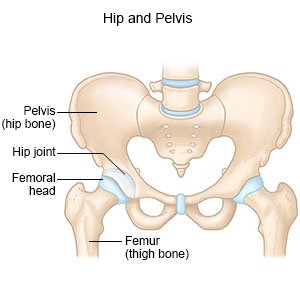Hip Pain
Medically reviewed by Drugs.com. Last updated on Aug 4, 2025.
What causes hip pain?
Hip pain can be caused by a number of conditions, such as bursitis, arthritis, or muscle or tendon strain. You may have swelling in the fluid-filled sacs that protect your muscles and tendons. Hip pain can also be caused by a lower back problem. Hip pain may be caused by trauma, playing sports, or running. Pain may start in your hip and go to your thigh, buttock, or groin.
 |
How can I manage hip pain?
You may need x-rays to make sure there are no broken bones that need to be treated.
- Rest your injured hip so that it can heal. You may need to avoid putting any weight on your hip for at least 48 hours. Return to normal activities as directed.
- Ice the injury for 20 minutes every 4 hours, or as directed. Use an ice pack, or put crushed ice in a plastic bag. Cover it with a towel to protect your skin. Ice helps prevent tissue damage and decreases swelling and pain.
- Elevate your injured hip above the level of your heart as often as you can. This will help decrease swelling and pain. If possible, prop your hip and leg on pillows or blankets to keep the area elevated comfortably.
- NSAIDs , such as ibuprofen, help decrease swelling, pain, and fever. This medicine is available with or without a doctor's order. NSAIDs can cause stomach bleeding or kidney problems in certain people. If you take blood thinner medicine, always ask your healthcare provider if NSAIDs are safe for you. Always read the medicine label and follow directions.
- Maintain a healthy weight. Extra body weight can cause pressure and pain in your hip, knee, and ankle joints. Ask your healthcare provider how much you should weigh. Ask him or her to help you create a weight loss plan if you are overweight.
- Use assistive devices as directed. You may need to use a cane or crutches. Assistive devices help decrease pain and pressure on your hip when you walk. Ask your healthcare provider for more information about assistive devices and how to use them correctly.
Related medications
Treatment options
The following list of medications are related to or used in the treatment of this condition.
When should I seek immediate care?
- Your pain gets worse.
- You have numbness in your leg or toes.
- You cannot put any weight on or move your hip.
When should I contact my healthcare provider?
- You have a fever.
- Your pain does not decrease, even after treatment.
- You have questions or concerns about your condition or care.
Care Agreement
You have the right to help plan your care. Learn about your health condition and how it may be treated. Discuss treatment options with your healthcare providers to decide what care you want to receive. You always have the right to refuse treatment. The above information is an educational aid only. It is not intended as medical advice for individual conditions or treatments. Talk to your doctor, nurse or pharmacist before following any medical regimen to see if it is safe and effective for you.© Copyright Merative 2025 Information is for End User's use only and may not be sold, redistributed or otherwise used for commercial purposes.
Learn more about Hip Pain
Treatment options
Care guides
- Acetaminophen and Ibuprofen Dosing in Children
- Back Pain
- Cold Symptoms in Children
- Fibromyalgia
- Musculoskeletal Pain
- Shoulder Pain
- Viral Syndrome in Children
Medicine.com guides (external)
Further information
Always consult your healthcare provider to ensure the information displayed on this page applies to your personal circumstances.
